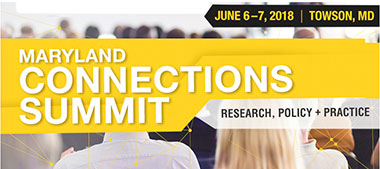
The Maryland State Department of Education, Office of Accountability is sponsoring the 2018 Maryland Connections Summit on June 6-7, 2018.
The 2018 Maryland Connections Summit brings together education professionals from across Maryland to highlight the vital role data plays in education decision making. Participants will hear from local, state, and national leaders on ways to bridge data, research, policy, and practice.
This two-day event provides an opportunity to share implementation experiences, research, and local initiatives that lead to positive student outcomes. The Summit is a place for dialog between stakeholders about evidence based practices. The Summit provides a forum for Maryland local education agencies to showcase best practices, most current research and local initiatives.
There is no fee to attend the summit. Remember—information about sessions and schedules will be updated regularly, so check the website often or follow
@MdPublicSchools!
WHO SHOULD ATTEND
Anyone involved in education data, research, or data/research-driven decision making—from pre-K through postsecondary—will find sessions to enhance their skills and knowledge. This includes:
Research:
- Local education agencies research and evaluation
coordinators
- Researchers from institutions of higher education
- Researchers from non-profits and think-tanks
Practice:
- Accountability coordinators
- Career and technical education specialists
- Curriculum specialists
- Special education specialists
- Assessment specialists
- Local education agency data specialists
- Communications and/or parent engagement
specialists
- Early childhood specialists
- Information technology specialists
Policy and Leadership:
- Superintendents and assistant superintendents
- School and central office administrators
- State and local policymakers, administrators, and
specialists
THEMES
The Maryland Connections Summit will explore how Maryland’s schools and systems collect, use, and reflect on data. Local education agencies, educators, research partners, and education organizations will share their work. Presentations will fit broadly into one of four themes.
Evidence-Based Activities, Strategies, and Interventions
The Every Student Succeeds Act (ESSA) requires that activities, strategies, interventions, and programs be selected based on existing data and research. ESSA also allows for the evaluation of programs should no evidence currently exist. Evidence-based decision-making is also a critical part of ensuring public dollars are well-spent. This strand explores how schools and school systems select, implement, and evaluate activities, strategies, and interventions in Maryland’s public schools. How do you choose new programs? How do you use data when implementing them? How do you know that they’re working?
No PARCC, No Problem
Data-driven decision making is only possible when data are available. How do you make decisions based on data when standardized data do not exist (for example, in subjects or grade levels for which there is no state test)? Presentations will showcase strategies, data collection instruments, or other practices that provide feedback for decision-making when there is no standardized data.
Using Data to Implement and Communicate Change
As education policy changes, organizations must become adept at understanding, implementing, and communicating those changes within and outside the organization. Presenters will share their experiences engaging educators and stakeholders. How do you communicate data about the performance of students and schools? How do you provide data to teachers, school leaders, and others (and how do they use that data themselves)? How do you provide meaningful professional development to educators so that they are using data and supporting new or existing policies?
Creating Infrastructures to Support Data Use
Organizations must be able to collect, access, analyze, and use data to inform decision-making, while ensuring privacy. This theme will explore the ways IT infrastructures and technology have been implemented to support data use. This theme will also include privacy related topics such as disclosure avoidance, suppression, and privacy. Presentations will include best practices, guidance, and implementation.